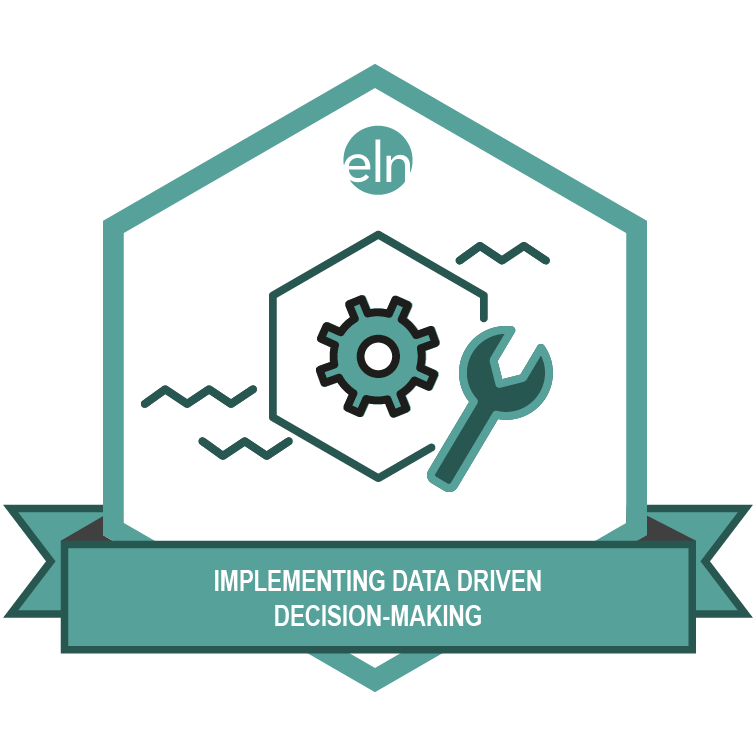Implementing Data-Driven Decision Making
Professional Development Credit – This Micro-Credential may be eligible for continuing professional development credit in your state. Contact your state affiliate association to learn more.
Overview – In Implementing Data-Driven Decision Making the practitioner demonstrates their skills and commitment to: continually investigating and analyzing data to make decisions; coach and mentor stakeholders to utilize and make effective data-driven decisions; create a culture of high-expectations for data-driven results; develop and implement policy and procedures to support DDDM; provide system-wide tools for ongoing monitoring, analysis, and implementation of DDDM; and provide a comprehensive plan for moving he learning community toward continuous improvement, ongoing assess of goal attainment, and achievement of effective, focused results.
Essential Outcomes – Implementing Data-Driven Decision-Making includes the following four identified essential outcomes:
- Create a culture of high expectations of results for student learning based on data-driven decisions.
- Provide, develop, and implement policy and processes for improving personal data analysis skills and those of all stakeholders.
- Provide tools and protocols for the ongoing monitoring, analysis, and use of data for continuous instructional improvement and student growth.
- Provide plan with strategies, implementation timelines, evaluation, and monitoring process to establish an environment in which all stakeholders collect, analyze, and use data to drive improvement.
Requirements
Part 1 – Overview Questions
Develop a responsive narrative that answers the following questions (1,000-word minimum):
- How did you collaborate with stakeholders to develop a vision for a school improvement initiative that focused on increasing student academic achievement using Implementing Data-Driven Decision-Making to establish goals?
- How did you educate the various stakeholder groups about the benefits of data-driven decision-making?
- What challenges in developing and increasing data analysis skills of your faculty members did you encounter and how did you overcome those obstacles?
- What resources did your faculty members require in order to increase trust in using data to measure progress on a school improvement initiative?
- What processes/policies/practices did you implement to ensure that Implementing Data-Driven Decision Making became the foundation for measuring academic achievement by decision-makers in your school (I.e. data teams, department heads, reading specialists, etc.) according to the plan?
- What processes and/or policies did you establish in your implementation plan(s) to ensure that Implementing Data-Driven Decision Making practices continue in the future?
Part 2 – Skill Demonstration Product with Self-Analysis
Develop a portfolio that captures the essential outcomes for Implementing Data-Driven Decision-Making. For each EO detail you will be required to reference an uploaded artifact(s) and guide the assessor to the specific evidence (page number, video time stamp, etc.) within the uploaded artifact(s). An explanation of how the evidence demonstrates proficiency of the outcome detail is also required. The practitioner must clearly and compellingly demonstrate proficiency of every detail under each essential outcome.
Part 3 – Reflection & ApplicationSubmit, in writing, a summary of your experience of Implementing Data-Driven Decision Making (500-word minimum); highlight and provide specific examples of how you applied the four components of a Implementing Data-Driven Decision Making culture. This could include topics covered; challenges or obstacles you addressed in order to develop a Implementing Data-Driven Decision Making culture in your school or district and professional development you completed in order to improve data analysis skills of stakeholders. Include a reflection about the impact of this skill on your professional practice and how you will continue to apply it in the future.
1. Verify your ELN account (or create one).
2. Purchase your Micro-Credential(s).
3. Check your email for access to the Micro-Credential portal (allow two business days).
Companion Course

Leading Data-Driven Decision Making
An ELN subscription is included when you purchase a Micro-Credential.
Contact support@edleadersnetwork.org if you have any problems purchasing a Micro-Credential.
Academic honesty is required in the submission of Micro-Credential artifacts. The use of artificial intelligence technology (e.g., ChatGPT) to generate narratives or fictionalize personal experience is strictly prohibited. Additionally, participant narratives that are substantially identical to another’s work may be investigated for plagiarism. A complete copy of our policy on AI and plagiarism can be found here.






